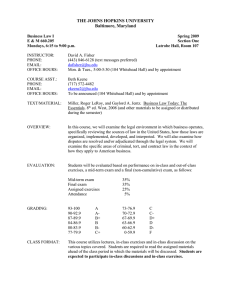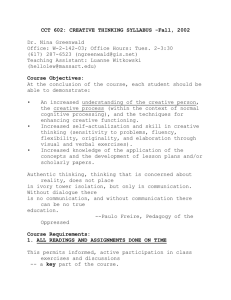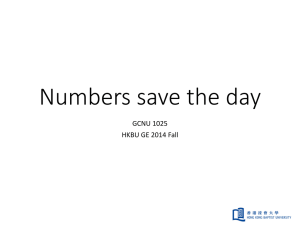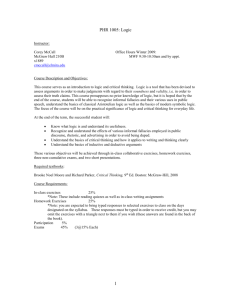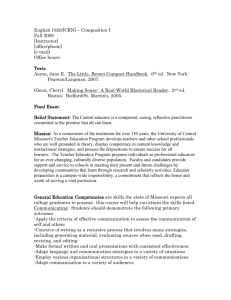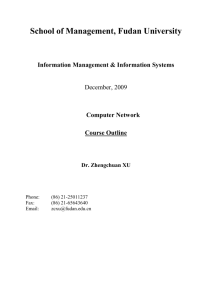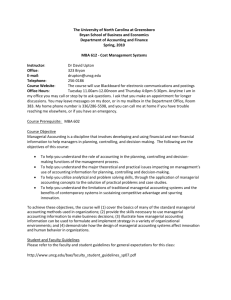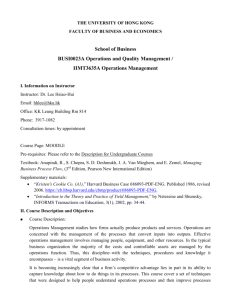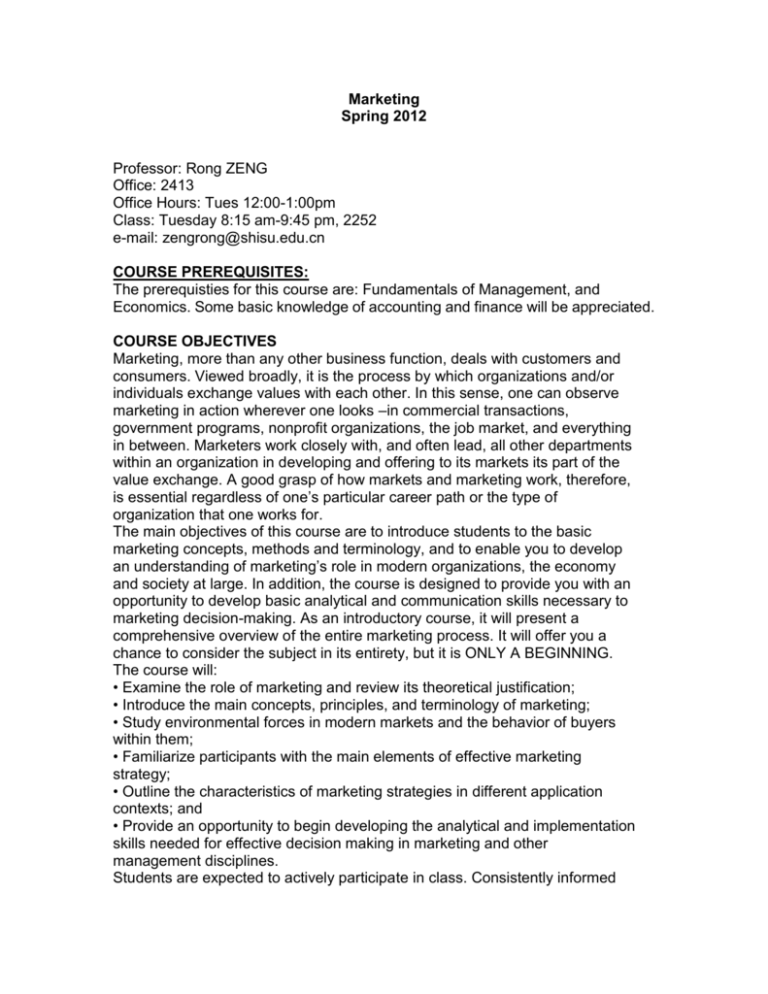
Marketing
Spring 2012
Professor: Rong ZENG
Office: 2413
Office Hours: Tues 12:00-1:00pm
Class: Tuesday 8:15 am-9:45 pm, 2252
e-mail: zengrong@shisu.edu.cn
COURSE PREREQUISITES:
The prerequisties for this course are: Fundamentals of Management, and
Economics. Some basic knowledge of accounting and finance will be appreciated.
COURSE OBJECTIVES
Marketing, more than any other business function, deals with customers and
consumers. Viewed broadly, it is the process by which organizations and/or
individuals exchange values with each other. In this sense, one can observe
marketing in action wherever one looks –in commercial transactions,
government programs, nonprofit organizations, the job market, and everything
in between. Marketers work closely with, and often lead, all other departments
within an organization in developing and offering to its markets its part of the
value exchange. A good grasp of how markets and marketing work, therefore,
is essential regardless of one’s particular career path or the type of
organization that one works for.
The main objectives of this course are to introduce students to the basic
marketing concepts, methods and terminology, and to enable you to develop
an understanding of marketing’s role in modern organizations, the economy
and society at large. In addition, the course is designed to provide you with an
opportunity to develop basic analytical and communication skills necessary to
marketing decision-making. As an introductory course, it will present a
comprehensive overview of the entire marketing process. It will offer you a
chance to consider the subject in its entirety, but it is ONLY A BEGINNING.
The course will:
• Examine the role of marketing and review its theoretical justification;
• Introduce the main concepts, principles, and terminology of marketing;
• Study environmental forces in modern markets and the behavior of buyers
within them;
• Familiarize participants with the main elements of effective marketing
strategy;
• Outline the characteristics of marketing strategies in different application
contexts; and
• Provide an opportunity to begin developing the analytical and implementation
skills needed for effective decision making in marketing and other
management disciplines.
Students are expected to actively participate in class. Consistently informed
participation, reflecting regular, close reading of the assigned texts is expected.
Two key principles shall guide this course: respect for others and academic
integrity.
READINGS
Required Reading:
Philip Kotler, Gary Armstrong, Principles of Marketing, 12th edition, Prentice
Hall (2009).
Additional materials may be assigned on certain topics.
Recommended Reading:
Bonoma, Thomas V., and Thomas Koznik (1989) Learning by the Case
Method in Marketing, Upper Saddle River, NJ: Pearson Prentice Hall in
conjunction with the Harvard Business School.
Mauffette-Leenders, Louise A., James A. Erskine, and Michiel R. Leenders
(2005) Learning with Cases. London ON: Richard Ivey School of Business,
University of Western Ontario
格雷厄姆·胡利,约翰·桑德斯,奈杰尔·皮尔西, 《营销战略与竞争定位》,中国人民大
学出版社,2007 年6 月
Assessments
Total Value
Group Project
20%
In-class exercises ***
10%
Participation **
10%
Final exam***
60%
TOTAL
100%
*NOTE: Students must achieve a minimum grade of 50% on the final exam AND a
minimum grade of 40% on the total grade for the group project to pass this
course.
** Participation includes class attendance and in-class case discussions. Absence
from the class will be penalized at 1 point per time. Several cases are assigned
for the in-class discussions. So you are expected to get prepared for the case
discussions and contribute your meaningful comments, observations and
questions in class.
*** The actual allocation among the in-class exercises and final exam may vary at
the end. The actual allocation will depend on the times of exercises we have in
class, which will depend on your knowledge of marketing basics.
Satisfactory In-term Performance
1. The criterion/criteria and the standard(s) for Satisfactory In-term Performance
are
as follow(s):
· Minimum grade of 40% on the total grade for the group project (presentation +
written report + peer evaluation = total grade).
2. Unsatisfactory In-term Performance in this course will lead to:
Failure in this course (regardless of the performance at the Final exam or final project) Yes
FND grade in this course (in case of missed Final exam or project)
Yes
A NOTE ON CLASS PARTICIPATION AND ATTENDANCE:
Your engagement and participation are necessary for learning and success.
Class participation is the classroom equivalent to professionals' participation in
meetings. It is, therefore, considered important to success in this course, whether
or not course grades are assigned for participation. Effective participation implies
active and continuous contribution to class proceedings on the part of students in
the form of raising or answering questions, commenting on issues raised by the
instructor or other students, or bringing to the attention of the class relevant items
of interest from the media or personal experiences.
Not attending class or leaving during a class (except in extenuating circumstances
and after informing the professor) is rude to the instructor and your fellow students
and disruptive of the learning environment. Such behavior is not appreciated in
any situation or organization, including this classroom. And the attendance will
count toward your participation grade. Failure to attend these classes will result in
a reduction of your participation grade. The penalty is 2 points per week missed.
METHOD AND OVERVIEW OF FORMAL ASSIGNMENTS
To accomplish the course objectives several learning methods are utilized. You
are strongly encouraged to participate in class discussions, which are the best
vehicle to fully express one's ideas and to let others benefit from them. Short case
studies will help develop and test your decision-making and communications
abilities. Short cases and/or other exercises may also be integrated into the
course lectures and discussions.
A comprehensive project will give you the opportunity to probe and report on an
international expansion situation that is of particular interest to you (and your
group members) and to present and defend your ideas in a public forum. A final
examination will help you consolidate the knowledge acquired throughout the
course. Guides to the group project will be issued later in class.
Group Contract
You will form into self-selected groups (4-8 students) week 2. This group will act
as a course resource for in-class case discussions, written case studies and
comprise the research team for the Marketing Plan project.
Late Penalty:
All assignments (group contract, individual case, group case, and the
comprehensive group project) are due at the beginning of class. Once the lecture
starts, your assignment is late. It is extremely rude to interrupt the lecture to hand
your assignment in; wait until the break. Late assignments are penalized at the
rate of 2 points per day (this includes the first day. If you hand your assignment in
after the lecture begins, you will lose 2 points). Do NOT slide your assignment
under the professor’s office door. If your assignment is late, you must make
arrangements to deliver the assignment to the professor at a time that is mutually
convenient.
An Important Note on Grading of the Comprehensive Report:
necessarily receive the same grade.
group member will turn in a group evaluation as described below.
will take 100 points and allocate those points to all the group members (including
him or herself) in accordance with the work done by each member. So, if there are
4 members in a group, and all 4 group members contribute equally, each would
be allocated 25 points. But, if a problem member (hopefully we will have none of
these) contributed very little, the remaining group members might allocate very
few points to that member. If most of the members of a group independently
assign few points to a particular member (indicating little contribution), that
individual’s grade for the Project will be adjusted downward depending on how
severe the lack of contribution. Of course, we don’t hope that this phenomenon to
happen since we encourage team work and participation from everyone.
In-Class Exercises and Final Exam
The exercises will be held during regular class time. It may mainly consist of
multiple choice questions, or may take the form of a short case. Regardless of
format, the exercises will be based on the textbook chapters assigned up to the
date and all lectures and materials covered in class.
The final examination will be held during the formal exam period for the term
courses. The exact date and time will be announced later in the term. The final
examination will be based on all topics covered (in class and in the readings)
during the term. It will be multiple-choice questions, essay questions as well as
short answer questions to a short case. Please note: students must achieve a
minimum of 50% on the final exam to pass the course.
CLASS SCHEDULE AND ASSIGNMENTS*
Week
Topics
1
Feb 21
2
Course
Chapter 1
A mini case
Explain the administrative issues
(Group Contract, evaluation,
presentation, etc.)
Chapter 2 Company and Marketing
Strategy
Chapter 3 Marketing Environments
Group contract due
A case assigned
Feb 29
3
Introduction to Marketing:
Overview
Readings/Assignments
March 6
4
March
13
Chapter 4 Managing Marketing
Information
Case analysis
5
Chapter 5 Consumer Markets and
Consumer Buyer Behavior (1)
6
March
27
Chapter 5 Consumer Markets and
Consumer Buyer Behavior (2)
Chapter 6 Business Markets and
Business Buyer Behavior
7
Chapter 7 Segmentation, Targeting and
Positioning (1)
Chapter 7 Segmentation, Targeting and
Positioning (2)
Case Analysis
9
Marketing Plan
April 17
Mid-term Exercise
10
Chapter 8 Product Life Cycle
April 24
Chapter 9 Product Strategies (1)
12
Chapter 9 Product Strategies (2)
Chapter 10 Pricing Strategies (1)
March
20
April 3
8
April 10
A mini case
A mini-case
A case assigned
Term case distributed
May 8
13
May 15
A case for in-class discussion
distributed
Chapter 10 Pricing Strategies (2)
15
Chapter 11 Place Strategies
May 29
Chapter 12 Promotion Strategies
16
Chapter 13 Creating Competitive
Strategies
Wrap Up
Review; Q & A
Exam Week
14
May 22
June 5
17
Group Project Report Due
June 12
18
* The above schedule only gives you a clue of what may be covered in this class.
While every attempt will be made to keep to the schedule listed above,
unforeseen circumstances may necessitate modifications throughout the
semester. And I expect great modifications will be made this semester since I am
not sure whether you have mastered marketing basics as I expect. Some cases
and readings will be distributed or posted on the Web.
Use of the Web
Students are encouraged to check the course site regularly for updated course
materials, announcements, etc. related to the course.
http://cc.shisu.edu.cn
http://cifc.shisu.edu.cn/share
IMPORTANT ADDITIONAL INFORMATION
GROUP WORK
We encourage group assignments in the school for several reasons. They provide
you with opportunities to develop and enhance interpersonal, communication,
leadership, follower-ship and other group skills. Group assignments are also good
for learning integrative skills for putting together a complex task. Your professor
may assign one or more group tasks/assignments/projects in this course.
A WORD ABOUT CELLPHONES
The use of cellular phones is not permitted in this class. It is disruptive to the
professor and class members. If you carry a phone to class, please make sure it is
turned off. If an emergency situation requires you to keep your cell phone turned
on, please discuss this with the instructor prior to the class.



